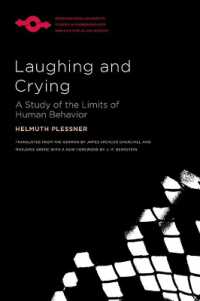- ホーム
- > 洋書
- > 英文書
- > Politics / International Relations
基本説明
Considers the evolution of international peacebuilding since the cold war and why, in particular, international peacebuilders frequently face difficulties in spreading democratic practices and the rule of law in war-torn societies.
Full Description
In a growing number of instances after the cold war, the United Nations and other international actors have sought to rebuild or establish new political institutions in states or territories recovering from violent conflict. From Afghanistan, Iraq and the western Balkans to less prominent wars in Africa, Asia, the Caribbean, Central America and the South Pacific, the international community's response involves extensive intrusions into the domestic affairs of sovereign states. Extending beyond the narrow mandates of traditional peacekeeping and humanitarian relief operations, these interventions aspire to reconstitute local power within a democratic framework. This book examines the evolution of international peacebuilding during this tumultuous period, identifying the factors that limit the progress of international actors to institutionalize democratic authority and the rule of law in war-shattered societies. Based on extensive field research, it gives particular attention to Afghanistan's Bonn Agreement process (2001-2005) and Post-Bonn period (2006-2009), in which the country's multiple, competing forms of authority (e.g., religious leaders, tribal elders, militia commanders, and technocrats) challenged efforts to create "modern" forms of political authority rooted in democratic norms and the rule of law. Despite the significant risks involved, this volume argues that the institutionalization of democratic legal authority can create the conditions and framework necessary to mediate competing domestic interests and to address the root causes of a conflict peacefully. At the same time, one overlooked problem of international peacebuilding stems from the divergent conceptions, between international officials and the local population, of authority and its sources of legitimacy. By helping a conflict-affected society reconcile the inherent tensions between competing forms of authority and, over time, deepen democracy-rather than lower the metrics for progress and conditions for exit, international peacebuilders can contribute to improved conditions for governance and a reduction in intra-state political violence. This examination of the peacebuilding-democratization nexus in war-torn societies aims to generate new insights for scholars, policy-makers, and practitioners in both the study and practice of politics and international relations.
Contents
Preface ; Maps ; List of Figures ; List of Tables ; List of Acronyms ; Introduction: Democratization after War in Retreat ; PART I: FOUNDATIONS ; 1. Analytical Tools to Understand and Evaluate Democratic Authority and Rule of law Institutionalization after War ; 2. International Peacebuilding through Democracy and Rule of Law Promotion: from the Cold War's End to the Peacebuilding Commission ; PART II: DEMOCRATIC PEACEBUILDING IN PRACTICE IN AFGHANISTAN ; 3. Implementing the Bonn Agreement for Afghanistan, 2001 to 2005 ; 4. Democratic Authority and Rule of Law Formation during and after the Bonn Agreement period ; PART III: THE FUTURE OF DEMOCRATIC PEACEBUILDING ; 5. Democratic Peacebuilding and its Alternatives: A New Approach for Sustainable Peace? ; 6. The Future of Afghanistan and International Peacebuilding ; Appendix I: Interviews Conducted ; Appendix II: Afghan Focus Group Questions ; Appendix III: Afghanistan Public Opinion Survey Questions ; Bibliography ; Index








